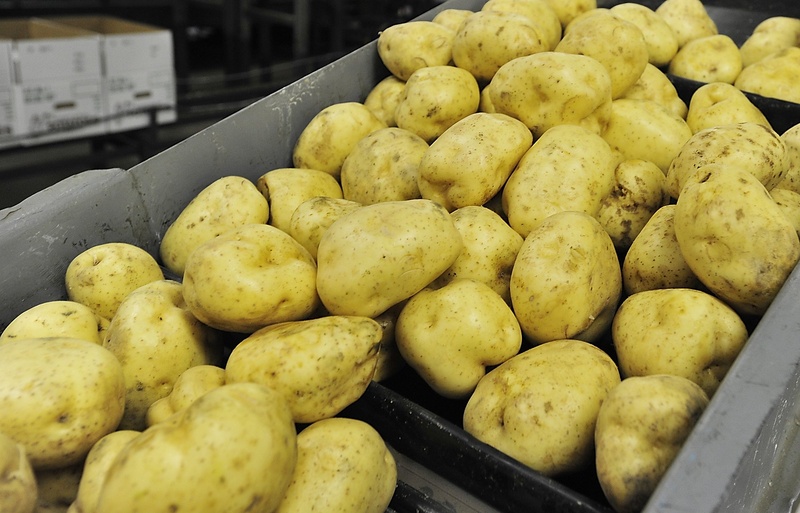Maine’s potato industry took a hit this week as negotiations with the largest processor in the state, McCain Foods in Easton, ended with cuts in the price paid to growers and a 20 percent reduction in the volume of orders.
“It’s going to be a very difficult year,” said Dana Wright of the Presque Isle-based Agricultural Bargaining Council, who led the negotiating team on behalf of about 60 growers throughout Aroostook County. “Our growers are going to have to be extremely frugal and try to weather the storm.”
Don Flannery, executive director of the Maine Potato Board, said growers had been prepared for the bad news since the french fry market nationwide has been stagnant at best or on the decline. But no one expected cuts this deep.
“I think the decrease in volume was more than what most people anticipated,” Flannery said.
Last year the price paid to growers per hundredweight of potatoes – 100 pounds – was $10.35. For the 2014 growing season, it will drop 48 cents to $9.87, roughly a 5 percent reduction. The state’s potato crop was valued at $168 million in 2013, according to the U.S. Department of Agriculture.
Even more troubling, Wright and Flannery said, is that McCain wants fewer potatoes from growers. And while he was not involved in contracts with Frito-Lay, another big purchaser of Maine potatoes for processing, Wright believes there will be similar cuts there. Smaller processors in the state include Naturally Potatoes in Mars Hill and Penobscot McCrum in Belfast.
Attempts by the Portland Press Herald to reach McCain Foods late Wednesday were unsuccessful.
Flannery said orders are being reduced in contracts across North America. “There has been a volume cut to some degree in every area,” he said. “The percentage here in Maine was greater.”
That’s not a reflection of the quality of Maine potatoes, but rather the state’s proximity to markets. “They wouldn’t produce french fries in Maine to sell in New Mexico,” Flannery said.
Wright said there seemed to be a correlation between the bad winter and a recent steep drop in demand for the potatoes destined for the french fry market. “We noticed it was down from December through March,” he said. “How many people are going to McDonald’s when it’s dark and cold and snowing outside? It’s not convenient. The weather played a big factor.”
Another factor, Flannery said, is health and dietary trends. The french fry may be beloved for its taste, but more people are cautious about consuming carbohydrates, and the supersize craze is no longer in full swing.
“The volume has continued to slide,” he said. “You saw that back when McDonald’s downsized their french fries. If you put fewer in a package, that is going to have an impact.”
Potato farmers generally earn profit margins of between 3 percent and 4 percent. Wright said $3,000 is the average cost to plant an acre of potatoes, and each acre can yield up to about 32,000 pounds. At the negotiated price, that would mean the farmer is paid about $3,158 per acre.
The growers could absorb a decrease in the price per hundredweight, but they’ll still have the same amount of land and fixed costs associated with owning it, including harvesting equipment. Most growers likely will have to plant fewer acres or face big losses with potatoes they can’t sell.
Some of the added costs are the direct result of trying to keep up with competition, in part by installing irrigation systems that help, but don’t guarantee, a good yield. The U.S. Department of Agriculture farm census shows that from 2007 to 2012, Maine farms overall added nearly 10,000 acres of irrigated land, a 47 percent increase.
Flannery said the cuts in the contracts from processors like McCain will likely be reflected in Aroostook County’s work force. “They may try to do it with less labor,” he said. “That is probably going to be one of the first places that they look.”
Wright said the negotiations were the most grueling he’s seen in his eight years negotiating on behalf of growers.
“This is the hardest one I’ve gone through, personally,” Wright said. “I’m tired.”
McCain is the largest potato processor in Aroostook County. About 68 percent of Maine potatoes are sold for processing – versus the fresh market – Flannery said. Most are grown in Aroostook County.
So what’s next for growers? Wright said most will cut back the volume of what they plant. There are other opportunities to sell potatoes, but they carry risks.
“We have the most opportunity on the fresh market,” he said. “But remember, you don’t contract with the fresh market,” which means market fluctuations could leave growers with a lot of potatoes they can’t sell.
“You’re not going to make it up in a year,” Flannery said of this year’s blow to business. “We can’t absorb it immediately. Maybe we can over time. … We’ve been through tough times in the past.”
Mary Pols can be contacted at 791-6456 or at:
mpols@pressherald.com
Send questions/comments to the editors.




Comments are no longer available on this story